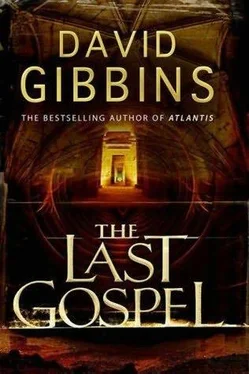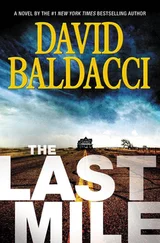David Gibbins - The Last Gospel
Здесь есть возможность читать онлайн «David Gibbins - The Last Gospel» весь текст электронной книги совершенно бесплатно (целиком полную версию без сокращений). В некоторых случаях можно слушать аудио, скачать через торрент в формате fb2 и присутствует краткое содержание. Жанр: Прочие приключения, на английском языке. Описание произведения, (предисловие) а так же отзывы посетителей доступны на портале библиотеки ЛибКат.
- Название:The Last Gospel
- Автор:
- Жанр:
- Год:неизвестен
- ISBN:нет данных
- Рейтинг книги:5 / 5. Голосов: 1
-
Избранное:Добавить в избранное
- Отзывы:
-
Ваша оценка:
- 100
- 1
- 2
- 3
- 4
- 5
The Last Gospel: краткое содержание, описание и аннотация
Предлагаем к чтению аннотацию, описание, краткое содержание или предисловие (зависит от того, что написал сам автор книги «The Last Gospel»). Если вы не нашли необходимую информацию о книге — напишите в комментариях, мы постараемся отыскать её.
The Last Gospel — читать онлайн бесплатно полную книгу (весь текст) целиком
Ниже представлен текст книги, разбитый по страницам. Система сохранения места последней прочитанной страницы, позволяет с удобством читать онлайн бесплатно книгу «The Last Gospel», без необходимости каждый раз заново искать на чём Вы остановились. Поставьте закладку, и сможете в любой момент перейти на страницу, на которой закончили чтение.
Интервал:
Закладка:
But this time there would be no return.
1
Jack Howard eased himself down on the floor of the inflatable boat, his back resting on one pontoon and his legs leaning against the outboard engine. It was hot, almost too hot to move, and the sweat had begun to trickle down his face. The sun had burned through the morning haze and was bearing down relentlessly, reflecting blindingly off the cliff face in front of him, the limestone scarred and worn like the tombs and temples on the rocky headland beyond. Jack felt as if he were in a painting by Seurat, as if the air had fragmented into a myriad pixels that immobilized all thought and action, that caught him in the moment. He pushed his hands through his thick hair, feeling the heat on his scalp, and stretched out his long arms to either side. He shut his eyes and took a deep breath, took in the utter stillness, the smell of wetsuits, the outboard engine, the taste of salt. It was everything he loved, distilled to its essence. It felt good.
He opened his eyes and peered over the side, checking the orange buoy he had released a few minutes before. The sea was glassy smooth, with only a slight swell rippling the edge where it lapped against the rock face. He reached out and put his hand on the surface, letting it float for a moment until the swell enveloped it. The water below was limpid, as clear as a swimming pool, and he could see far down the anchor line into the depths, to the shimmer of exhaust bubbles rising from the divers below. It was hard to believe this had once been a place of unimaginable fury, of nature at her cruellest, of untold human tragedy. The most famous shipwreck in history. Jack hardly dared think of it. For twenty years he had wanted to come back to this place, a yearning which had nagged at him and become a gnawing obsession, ever since his first doubt, since he had first begun to reassemble the pieces. His intuition rarely failed him, tried and tested over years of exploration and discovery around the world. It was an intuition based on hard science, on an accumulation of facts that had begun to point unswervingly in one direction.
He had been sitting here, off Capo Murro di Porco in Sicily in the heart of the Mediterranean, when he had first dreamed up the International Maritime University. Twenty years ago he had been on a shoestring budget, leading a group of students driven by their passion for diving and archaeology, with equipment cobbled together and jerry-built on the spot. Now he had a multi-million budget, a sprawling seafront campus on his former family estate in south-west England, the place where Howards had lived for generations before Jack’s father turned the house and grounds over to the fledgling institution. There were museums around the world, state-of-the-art research vessels, an extraordinary team at IMU who took the logistics out of his hands. But in some ways little had changed. No end of money could buy the clues that led to the greatest discoveries, the extraordinary treasures that made it all worthwhile. Twenty years ago they had been following a tantalizing account left by Captain Cousteau’s divers, intrepid explorers at the dawn of shipwreck archaeology, and here he was again, floating above the same site with the same battered old diary in his hands. The key ingredients were still the same, the hunches, the gut feeling, the thrill of discovery, that moment when all the elements suddenly came together, the adrenaline rush like no other.
Jack shifted, pushing his diving suit further down around his waist, and checked his watch. He was itching to get wet. He glanced overboard. There was a slight commotion as Pete and Andy, the divers who had been sent down to anchor the shotline, pulled the buoy underwater. Jack could see it now, refracted five metres below, deep enough to avoid the props of passing boats but shallow enough for a free diver to retrieve a weighted line that hung from it as a mooring point. He had already dared to look ahead, had begun to eye the site like a field commander planning an assault. Their research vessel Seaquest II could anchor in a sheltered bay around the cape to the west. On the headland itself the rocky seashore dropped in a series of stepped shelves, good for a shore camp. He rehearsed all the ingredients of a successful underwater excavation, knowing that each site produced its fresh crop of challenges. Any finds they made would have to go to the archaeological museum in Syracuse, but he was sure the Sicilian authorities would make a good show of it. IMU would establish a permanent liaison with their own museum at Carthage in nearby Tunisia, perhaps even an air shuttle as a package trip for tourists. They could hardly go wrong.
Jack peered down, checked his watch again, then noted the time in the logbook. The two divers were at the decompression stop. Twenty minutes to go. He cupped his left hand in the sea and splashed the water over his head, feeling it trickle through his thick hair and down his neck. He leaned back, stretched his long legs down the boat, made himself relax and take in the perfect tranquillity of the scene for a moment longer. Only six weeks earlier he had stood by the edge of an underwater cavern in the Yucatan, drained but exhilarated at the end of another extraordinary trail of discovery. There had been losses, grievous losses, and Jack had spent much of the voyage home ruminating on those who had paid the ultimate price. His boyhood friend Peter Howe, missing in the Black Sea. And Father O’Connor, an ally for all too brief a time, whose appalling death had brought home the reality of what they were ranged against. Always it was the bigger stake that provided the solace, the innumerable lives that could have been lost had they not relentlessly pursued their goal. Jack had become used to the greatest archaeological prizes coming at a cost, gifts from the past that unleashed forces in the present few could imagine existed. But here, he felt sure of it, here it was different. Here it was archaeology pure and simple, a revelation that could only thrill and beguile any who came to know of it.
He peered into the glassy stillness of the sea, saw the rocky cliff face underwater disappear into the shimmering blue. His mind was racing, his heart pounding with excitement. Could this be it? Could this be the most famous shipwreck of all antiquity? The shipwreck of St Paul?
‘You there?’
Jack raised his foot and gently prodded the other form in the boat. It wobbled, then grunted. Costas Kazantzakis was about a foot shorter than Jack but built like an ox, a legacy of generations of Greek sailors and sponge-fishermen. Like Jack he was stripped to the waist, and his barrel chest was glistening with sweat. He seemed to have become moulded to the boat, his legs extended on the pontoon in front of Jack and his head nestled in a mess of towels at the bow. His mouth was slightly open and he was wearing a pair of wraparound fluorescent sunglasses, a hilarious fashion accessory on such an unkempt figure. One hand was dangling in the water, holding the hoses that led down to the regulators at the decompression stop, and the other was draped over the valve of the oxygen cylinder that lay down the centre of the boat. Jack grinned affectionately at his friend, who meant far more to him than his official role as IMU’s chief engineer. Costas was always there to lend a hand, even when he was dead to the world. Jack kicked him again. ‘We’ve got fifteen minutes. I can see them at the safety stop.’
Costas grunted again, and Jack passed over a water bottle. ‘Drink as much as you can. We don’t want to get the bends.’
‘Good on you, mate.’ Costas had learned a few comically misplaced catchphrases in his years based at the IMU headquarters in England, but the delivery was still resolutely American, a result of years spent at school and university in the States. He reached over and took the water, then proceeded to down half the bottle noisily.
Читать дальшеИнтервал:
Закладка:
Похожие книги на «The Last Gospel»
Представляем Вашему вниманию похожие книги на «The Last Gospel» списком для выбора. Мы отобрали схожую по названию и смыслу литературу в надежде предоставить читателям больше вариантов отыскать новые, интересные, ещё непрочитанные произведения.
Обсуждение, отзывы о книге «The Last Gospel» и просто собственные мнения читателей. Оставьте ваши комментарии, напишите, что Вы думаете о произведении, его смысле или главных героях. Укажите что конкретно понравилось, а что нет, и почему Вы так считаете.












